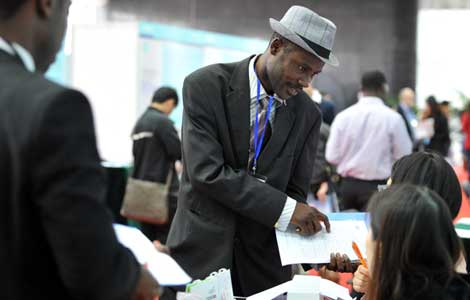Government must bite the bullet
Updated: 2013-07-11 08:08
By Zhao Xiao and Chen Jinbao (China Daily)
|
||||||||
Further reductions in administrative costs and improvements in efficiency needed in the face of lower fiscal revenue
China's central fiscal revenue declined 0.8 percent year-on-year in the first four months of this year, and a per capita 11.3 percent monthly growth is needed in the following months if the country wants to achieve the growth target set early this year, according to a report delivered to the Standing Committee of the National People's Congress on June 27 by the Minister of Finance, Lou Jiwei.
Considering lukewarm economic growth in the latter half of this year and a possible fiscal revenue decline, as a result of the widespread implementation of the policy to convert business tax into value added tax, due on August 1, China's full-year central fiscal revenue faces gloomy prospects.
Similarly, there has been lower-than-expected growth in local fiscal revenue. China's local fiscal revenue was 4.89 trillion yuan ($798 billion) in the first five months, a 6.9 percent increase year-on-year, 2.5 percentage points lower than a year earlier. The fiscal revenue grew only 0.1 percent year-on-year in the Inner Mongolia autonomous region in the first five months, much lower than a planned 14 percent full-year growth, while Liaoning province witnessed 5.2 percent growth during the same period, compared with the planned full-year growth of 11 percent, and Shaanxi province witnessed 6.55 percent growth, in sharp contrast with a 16 percent growth planned for the whole year.
Worse, the recent "liquidity crunch" that broke out among some domestic banks makes the outlook for the country's fiscal revenues at both the central and local levels even gloomier in the context of the weak national economic momentum.
It is widely believed that the recent liquidity insufficiency was a temporary and structural monetary problem largely caused by seasonal interest rate fluctuations and panics following the changes in market expectations. However, a series of problems accumulated among domestic banks, such as huge volumes of interbank debts and their maturity mismatch, cannot be resolved within a short period. This, together with increased pressures for performance assessment at the end of every quarter, the expiry of wealth management products, the outflow of hot money and tightening financial supervision from the authorities, means that the funds in China's financial system will tend to be at a tightened balancing level in the latter half of this year.
The new leadership's unambiguous refusal to inject liquidity into the market has sounded an alarm that financial institutions should stop their previous practice of excessively using maturity mismatch for financial expansion. It is expected that domestic financial institutions will strengthen their liquidity management, accelerate deleverage of their wealth management products and optimize their credit structures in a bid to channel more funds into the real economy in the future. Such kind of funds rebalancing and the prioritizing of the real economy will facilitate the transformation of China's economic structure and its long-term growth, but it will also be a drag on its fiscal revenue growth.
The accelerated efforts for funds rebalancing to be expected within the country's banking system will possibly expose its hidden local debt risks at an earlier date. There have been concerns over its accumulated local debt risks since 2009. Due to strengthened efforts from the authorities to tighten bank loans since the start of 2012, many of the country's local financing platforms have begun to turn to trust loans and other financing forms in an attempt to borrow new money to pay off old debts, which has to some extent eased their debt-paying pressures.
However, the tightened flow of credit and trust funds to local financing platforms pushed by commercial banks following the recent liquidity crunch will inevitably aggravate short-term local debt risks. Due to their desire not to default on their debts borrowed via their financing vehicles for the sake of continuous financing in the future, local governments will possibly use some of their fiscal revenues to pay off debts, thus adding to their fiscal crisis.
The assets restructuring pushed by domestic commercial banks will negatively affect credit-driven real estate development and thus indirectly influence local fiscal revenue. A large-scale flow of funds to the property sector in recent years has continuously fueled the rise of property prices, benefiting both banks and developers. At the same time, the ever-bulging revenues from land sales and tax have also made local governments become the largest beneficiary of the real estate-dependent economic model.
The unavoidable deleverage for interbank financial and trust products following the recent liquidity crunch will inevitably reduce the funds for real estate development and thus dampen developers' enthusiasm for buying land, which will result in a decline in local land sales revenues. Money insufficiency will also foil local governments' hopes of utilizing an easy monetary policy to stimulate local economic growth and boost their fiscal revenues.
Compared with its flat purses, the country's fiscal spending has kept rocketing both at the central and local levels. In the first five months, outlays at the expense of public coffers amounted to 4.66 trillion yuan, a 13.2 percent increase from the same period last year, or 7.1 percentage points higher than the country's fiscal revenue growth.
Facing growing fiscal pressures in the context of a "money shortage" and financial and tax reforms, the government should realize that low fiscal revenue growth will be common in the future and that preparations should be made for fiscal austerity.
The government should further reduce its administrative costs and improve its administration efficiency through delegating more power to lower departments and promoting government restructuring to reduce interventions into microeconomic activities. The awareness that it should live within its fiscal capacity should be cultivated to avoid excessive spending.
Zhao Xiao is a professor with the School of Economics and Management, Beijing University of Science and Technology, and Chen Jinbao is an economics PhD at the school.
(China Daily 07/11/2013 page8)

 Sino-US talks 'help build trust'
Sino-US talks 'help build trust'
 Boston Marathon bombing suspect pleads not guilty
Boston Marathon bombing suspect pleads not guilty
 Caution urged in seeking experts from abroad
Caution urged in seeking experts from abroad
 Shanghai struggles with growth
Shanghai struggles with growth
 Trade town turns to tourism
Trade town turns to tourism
 Project focuses on unmarried youths
Project focuses on unmarried youths
 Safety fears after iPhone 4 explodes
Safety fears after iPhone 4 explodes
 China donates wax figure of Kim Jong-il to DPRK
China donates wax figure of Kim Jong-il to DPRK
Most Viewed
Editor's Picks

|

|

|

|

|

|
Today's Top News
Obama pushes House Republicans on immigration
Chinese researcher pleads guilty in US drug case
US Navy completes 1st unmanned carrier landing
Dialogue starts with calls for closer cooperation
Nations vow regular exchanges
Program to help migrant workers find better jobs
Saving dogs brings hefty bill for rescuers
Fairness in organ system ensured
US Weekly

|

|








